What to Expect If You Take a Course Taught by Condoleezza Rice at Stanford
 Last month JBHE reported that former secretary of state Condoleezza Rice was returning to Stanford University. Rice is a professor of political science and the Thomas and Barbara Stephenson Senior Fellow on Public Policy at the Hoover Institution. Last month JBHE reported that former secretary of state Condoleezza Rice was returning to Stanford University. Rice is a professor of political science and the Thomas and Barbara Stephenson Senior Fellow on Public Policy at the Hoover Institution.
Rice will be working on two books and lecturing. She won’t be returning to the classroom immediately, but when she is ready to resume teaching she plans to focus on the process of making difficult foreign policy decisions. Rice will place students in simulations where they will go through the process of making a tough decision on a matter of national importance. While she will use historical simulations to teach students how certain decisions were made, she prefers to use simulations of events that may happen in the near future. She recently told the Stanford Report, “Students need to think about not just the abstraction of policy but the actual operational questions and choices.”
On Faculty Diversity, Johns Hopkins University Puts Its Money Where Its Mouth Is
Many colleges and universities pay lip service to the view that they want to increase the racial diversity of their faculties. But very few actually take concrete steps to make it happen.
 Recently Johns Hopkins University in Baltimore announced the Mosaic Initiative, a five-year program that would allocate $1 million each year in matching funds from the administration for deans, department chairs, and search committees to use to attract black and other minority faculty members. The initiative is under the direction of Ray Gillian, vice provost for institutional equity. Recently Johns Hopkins University in Baltimore announced the Mosaic Initiative, a five-year program that would allocate $1 million each year in matching funds from the administration for deans, department chairs, and search committees to use to attract black and other minority faculty members. The initiative is under the direction of Ray Gillian, vice provost for institutional equity.
Departments at Johns Hopkins can ask the university administration for funds for salary, research, and laboratory equipment and supplies. There are also funds available to invite eligible minority faculty and graduate students to come to Johns Hopkins to present their research or to participate in career development workshops.
Eight minority faculty members were hired with Mosaic Initiative funds over the past year. The university hopes that over the five years of the program 30 or more new minority faculty will be hired.

RUTGERS UNIVERSITY
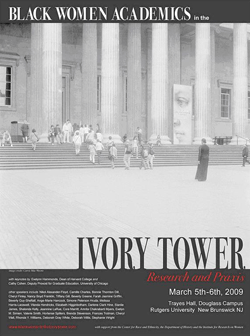
Black Women in the Ivory Tower:
Research & Praxis
March 5-6, 2009
The Rutgers University Center for Race and Ethnicity, Institute for Research on Women, and Department of History announce a multi-disciplinary conference on African American Women in the Academy. Admission is free and open to the public. For information and registration go to www.blackwomenintheivorytower.com. Any e-mail inquiries can be sent to [email protected].
Keynote Speakers: Evelynn Hammonds, Dean of Harvard College and Cathy Cohen, Deputy Provost of Graduate Education, University of Chicago
Go to the conference website to see a full list of the speakers.

Black Colleges and Universities That Have Shown Substantial Improvement in African-American Student Graduation Rates
JBHE has collected student graduation rate statistics going back to 1998 for a group of 36 historically black universities. The good news is that during this period 19 of the 35 colleges and universities have seen an improvement in their black student graduation rates. Sixteen black colleges and universities showed a decline in their black graduation rate.
Over the past decade there have been huge differences in graduation rates at some of these HBCUs. For example, at Howard University the black student graduation has improved from 47 percent in 1998 to 62 percent in 2008. Other schools showing large improvements in their black student graduation rates are Lincoln University in Missouri, Tennessee State University, Alcorn State University, Paine College, and Prairie View A&M University. All of these black colleges and universities have seen a 10 percentage point or more rise in black student graduation rates over the past 10 years.
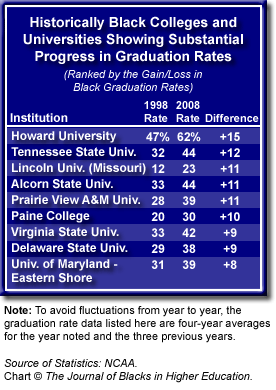
Legislation Includes $60 Million in Grants for Colleges and Universities to Combat Hate Crimes
 Texas Congresswoman Sheila Jackson Lee has reintroduced the David Ray Ritcheson Hate Crime Prevention Act. Ritcheson was a Texas teen who was brutally attacked by two skinheads who yelled “white power” during the attack. Ritcheson committed suicide the next year. Texas Congresswoman Sheila Jackson Lee has reintroduced the David Ray Ritcheson Hate Crime Prevention Act. Ritcheson was a Texas teen who was brutally attacked by two skinheads who yelled “white power” during the attack. Ritcheson committed suicide the next year.
The legislation would permit a victim of a hate crime to take time off from work under the Family and Medical Leave Act. Unemployment benefits would be available to hate crime victims who miss work because of the hate crime. The bill would also authorize the Department of Housing and Urban Development to issue grants to provide housing assistance to hate crime victims. Money would be provided for hate crime victims and their families who need counseling.
Finally, the bill authorizes the Department of Education to award grants to institutions of higher education to develop education and training programs designed to prevent and reduce the incidence of hate crimes. Funds would also be available for professional training and development for faculty and administrators on the causes and effects of hate crimes.
The bill authorizes $10 million a year from 2010 to 2015 for the grants to higher education.
Gossip Website With Extensive Racist Content Calls It Quits
 In a past issue JBHE reported on the wide range of racist content posted at the website JuicyCampus.com. For the past two years university students were able to post uncensored and anonymous comments on just about any topic. Many of the posts were sexist, homophobic, or racist. A large number of posts on the site named women who are deemed sexually promiscuous or provided details on the length of a male’s sex organ. When JBHE visited the JuicyCampus.com site some months ago we found hundreds of posts that contained the word “nigger.” In a past issue JBHE reported on the wide range of racist content posted at the website JuicyCampus.com. For the past two years university students were able to post uncensored and anonymous comments on just about any topic. Many of the posts were sexist, homophobic, or racist. A large number of posts on the site named women who are deemed sexually promiscuous or provided details on the length of a male’s sex organ. When JBHE visited the JuicyCampus.com site some months ago we found hundreds of posts that contained the word “nigger.”
JuicyCampus.com had become the twenty-first century equivalent of graffiti on the inside walls of a bathroom stall.
But now JuicyCampus.com has shut down due to a sharp drop in online advertising revenue and venture capital funding. Good riddance.
Historically Black Universities Struggling in Tough Economic Times
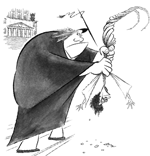 Due to the troubled economy, Clark Atlanta University has dismissed 70 faculty members and 30 other staffers. Classes were called off one day this past week so that administrators could realign class enrollments. Some classes were combined or eliminated due to the thinning of faculty ranks. All physical education classes were eliminated. Due to the troubled economy, Clark Atlanta University has dismissed 70 faculty members and 30 other staffers. Classes were called off one day this past week so that administrators could realign class enrollments. Some classes were combined or eliminated due to the thinning of faculty ranks. All physical education classes were eliminated.
In a letter to the campus community, Clark Atlanta University president Carlton E. Brown stated that enrollments have dropped by 200 students this semester and are off 22 percent from 2001. In addition, President Brown stated that the university’s endowment had dropped in value by 25 percent over the past six months.
Morehouse College, the historically black educational institution for men in Atlanta, announced that 25 adjunct professors would not have their contract renewed for the spring semester. This is one third of the part-time faculty at the college.
At nearby Spelman College, enrollment is down 3 percent this semester. The college is eliminating 23 staff positions. The continuing education program and the college’s department of education will be eliminated. All workers will have a one-week nonpaid furlough following this semester’s commencement ceremony.
The Charles Drew University of Medicine and Science in Los Angeles announced that it was laying off 10 percent of its faculty and staff. Executive salaries at the university are being cut by 10 percent. Other staff members with annual salaries of more than $42,000 will see their pay cut by 5 percent. University contributions to employee retirement fund accounts have been suspended.
The university, which enrolls 352 students, almost all of whom are black or Latino, hopes to save $10 million from these measures.
  |
45.6% Male percentage of total enrollments at all of the nation’s historically black colleges and universities in 1980.
38.5% Male percentage of total enrollments at all of the nation’s historically black colleges and universities in 2005.
source: U.S. Department of Education
|
Honors and Awards
 • G. Dale Wesson, interim vice president for research at Florida A&M University in Tallahassee, received the Professional Chemical Engineering Award from the National Organization for the Professional Development of Black Chemists and Chemical Engineers. • G. Dale Wesson, interim vice president for research at Florida A&M University in Tallahassee, received the Professional Chemical Engineering Award from the National Organization for the Professional Development of Black Chemists and Chemical Engineers.
 • The Rev. Anthony Paige, senior pastor of the First Baptist Church of Lamberts Point, Virginia, received the Hugo Owens Martin Luther King Jr. Memorial Award from Old Dominion University. Reverend Paige served on the university’s board of visitors from 1995 to 2003 and currently is co-chair of the university’s task force on security. • The Rev. Anthony Paige, senior pastor of the First Baptist Church of Lamberts Point, Virginia, received the Hugo Owens Martin Luther King Jr. Memorial Award from Old Dominion University. Reverend Paige served on the university’s board of visitors from 1995 to 2003 and currently is co-chair of the university’s task force on security.
• Larry Hawkins, director of special programs and college preparation at the University of Chicago, received the university’s Diversity Leadership Award. Hawkins has served as head of educational outreach programs for minority students since 1968.
• Joseph N. Green Jr., former vice mayor of Norfolk, Virginia, was honored by Tidewater Community College by having the regional administration building named in his honor.
 • Vincent W. Patton III, chair of the editorial board of the U.S. Naval Institute and a member of the board of visitors for the National Defense Intelligence College, received the Mack McKinney Award from the Non-Commissioned Officers Association. • Vincent W. Patton III, chair of the editorial board of the U.S. Naval Institute and a member of the board of visitors for the National Defense Intelligence College, received the Mack McKinney Award from the Non-Commissioned Officers Association.
Patton was the first African American to achieve the rank of master chief petty officer for the U.S. Coast Guard. He is a graduate of Pacific College and holds a master’s degree from Loyola University of Chicago, a master of theology degree in applied religious studies from the Graduate Theological Union in Berkeley, California, and an educational doctorate from American University.
|
Budget Cuts Will Mean Fewer Places for Freshman Students at the University of California: But the Number of Applicants of All Races Is Up
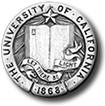 The University of California has announced that it will seek to reduce the size of the entering class in 2009 by about 6 percent because of cutbacks in state funding. But with fewer places available, the university system reports that the number of applications is up. This will create a more selective admissions process. And remember that by law, all admissions decisions at California state universities must be made without consideration of race. The University of California has announced that it will seek to reduce the size of the entering class in 2009 by about 6 percent because of cutbacks in state funding. But with fewer places available, the university system reports that the number of applications is up. This will create a more selective admissions process. And remember that by law, all admissions decisions at California state universities must be made without consideration of race.
The University of California reports that it received 4,332 applications from African-American students for places in the Class of 2013 at its nine undergraduate campuses. This is an increase of 5.8 percent from last year.
The number of black applicants increased at six of the nine undergraduate campuses. At the state’s flagship campus at Berkeley there were 2,048 black applicants, up 3.2 percent from 2008. But at the prestigious UCLA campus the number of blacks applying for admission dropped by nearly 3 percent.
  |
“I have no problem with criticism. I’m an academic. Debate is natural. That’s what academic institutions ought to be about.”
— Condoleezza Rice, speaking on the prospects of engaging students at Stanford University who will be highly critical of the Bush administration’s foreign policies, in the Stanford Report, 1-28-09 (See story above.)
|
Victoria’s Secret Enters Merchandising Pact With Five Black Universities
 Victoria’s Secret, the highly successful lingerie and women’s apparel retail operation, began its Pink Collegiate Collection last summer. The retailer offers a wide selection of merchandise that includes the logos of 30 colleges and universities. Victoria’s Secret, the highly successful lingerie and women’s apparel retail operation, began its Pink Collegiate Collection last summer. The retailer offers a wide selection of merchandise that includes the logos of 30 colleges and universities.
Now, for the first time, five historically black colleges and universities have become part of the Victoria’s Secret Pink Collegiate Collection. The five participating institutions are Florida A&M University, Howard University, Hampton University, North Carolina A&T State University, and Southern University.
To promote its new merchandising agreement with the HBCUs, Victoria’s Secret is sponsoring a competition between the five schools. Online and in-store sales of each school’s Victoria Secret’s merchandise will be tracked over a four-week period. The school with the highest total will be visited by Victoria’s Secret models and the Pink Band this spring.
Bill Cosby’s Effort Teaches Central State University to “Fish”
 Central State University in Wilberforce, Ohio, was presented with a unique challenge by comedian Bill Cosby. Cosby promised that if the university could raise $2 million by April 1, he would perform free of charge in a benefit for the university at the Schottenstein Center in Columbus. Cosby told the campus community, “I don’t want to be in the check-writing business anymore. What I want to do is to teach people how to fish.” Central State University in Wilberforce, Ohio, was presented with a unique challenge by comedian Bill Cosby. Cosby promised that if the university could raise $2 million by April 1, he would perform free of charge in a benefit for the university at the Schottenstein Center in Columbus. Cosby told the campus community, “I don’t want to be in the check-writing business anymore. What I want to do is to teach people how to fish.”
The money was raised well in advance of the deadline and the benefit concert is scheduled for April 18. More than $250,000 will be raised from ticket sales. The money raised will be used to strengthen academic programs, enhance learning facilities, and to expand merit- and need-based scholarship programs.
Sharp Rise in Number of Black Applicants at the University of Virginia
It is no secret that, economically, times are tough. It is no coincidence that colleges and universities with generous financial aid programs such as Princeton, Harvard, Stanford, and the University of North Carolina at Chapel Hill are seeing a sharp rise in applications.
 Add the University of Virginia to the list. Its AccessUVA financial aid program assigned the university the “best value” among public universities in the latest rankings by the Princeton Review. Add the University of Virginia to the list. Its AccessUVA financial aid program assigned the university the “best value” among public universities in the latest rankings by the Princeton Review.
The University of Virginia reports a record 21,511 applications for its Class of 2013. Applications from all minority groups were up sharply. The university reports that the number of blacks who applied for admission increased by 22 percent over a year ago. In 2008 there were 1,366 black applicants to the University of Virginia.


Associate Professor of Studio Methods,
School of Fashion
Parsons The New School for Design seeks applicants for a tenure-track faculty position at the rank of Associate Professor within the School of Fashion. This position is dependent on budget approval from the Office of the Provost. The Associate Professor is expected to teach 12 hours per week, hold regular office hours for students and colleagues, and to participate in other classroom activities on a regular basis (e.g., critiques, juries, review panels, thesis supervision, independent study, internship supervision, department citizenship, committees, etc.).
Requirements
- M.F.A. in Fashion Design or equivalent industry experience.
- Teaching experience at university level.
- Interest in developing serious critical, historical, and theoretical discussions around fashion design in the classroom/studio.
- Thorough knowledge of the current genres and markets of the fashion design industry, both international and domestic, including trend and category awareness.
- Technical and professional expertise that extend from illustration skills to experience in fabrication resourcing and production.
- Experience with diverse approaches to garment construction and fabrications.
- Design and construction expertise that includes an understanding of pattern drafting and draping.
- Ability to develop and nurture individual student’s design abilities and a strong commitment to progressive fashion design education.
- Excellent writing and interpersonal communication skills.
- Good management skills, including the ability to communicate and motivate effectively.
- Active/current professional or experimental creative practice. Preferred minimum 5 years of experience as a professional fashion designer.
- Digital design experience optional (e.g. CAD, Optitex, etc.).
A letter of application relating experience and interests to the opportunities and requirements of the position together with a Curriculum Vita should be submitted online at http://careers.newschool.edu.
Start Date: July 1, 2009
Salary: Competitive.
Benefits: Comprehensive University benefits package.

Joint Effort by Stanford and Harvard to Focus on Alleviating American Poverty
 Stanford University and Harvard University have formed the Collaboration for Poverty Research, a joint effort to focus attention and win public support for new measures to solve the persisting problem of poverty in America. The collaboration will support four specific projects: Stanford University and Harvard University have formed the Collaboration for Poverty Research, a joint effort to focus attention and win public support for new measures to solve the persisting problem of poverty in America. The collaboration will support four specific projects:
• A national task force to investigate American poverty and social inequality.
• A social policy laboratory that promotes science-based evaluations and policy innovations that expand economic opportunity and social mobility.
• A graduate and undergraduate intern program where students will work with the national task force or the social policy laboratory.
• A series of executive roundtable forums to foster an exchange of ideas between researchers and policymakers.
The new effort will link Stanford’s Center for the Study of Poverty and the Multidisciplinary Program in Inequality and Social Policy at the Kennedy School of Government at Harvard University.
The new program is funded by a $3.9 million grant from the Elfenworks Foundation.
In Memoriam
Robert L. Callaway (1963-2009)
Robert L. Callaway, dean of social sciences and human services at Lorain County Community College in Elyria, Ohio, died at his home near campus. He was 45 years old.
Dr. Callaway had been an administrator at the college for the past decade. He was a graduate of Livingstone College in Salisbury, North Carolina. Dr. Callaway held a master’s degree from North Carolina A&T State University and an educational doctorate from Bowling Green State University.
Morris Lee Ridley (1923-2009)
Morris Lee Ridley, who taught psychology at Virginia State University for 14 years, died from prostate cancer at a hospice center in Henrico County, Virginia. He was 85 years old. His ashes were scattered on the Virginia State University campus.
Professor Ridley was an expert on the psychology of criminal behavior. In 1971 he was the first African American to be appointed to the Virginia Probation and Parole Board, where he served for 17 years.
Professor Ridley held bachelor’s and master’s degrees in experimental psychology from Howard University.
Appointments
 • Loury Ollison Floyd, assistant professor of education at North Carolina A&T State University in Greensboro, was appointed student coordinator for the North Carolina Council for Exceptional Children. • Loury Ollison Floyd, assistant professor of education at North Carolina A&T State University in Greensboro, was appointed student coordinator for the North Carolina Council for Exceptional Children.
 • Opeoluwa Fawole, a sophomore at the University of Georgia, was selected for participation in the Howard Hughes Medical Institute’s Exceptional Research Opportunities Program. Fawole, who is majoring in microbiology, is conducting research on the genetics of a parasite transmitted by mosquitoes that can cause severe cases of malaria. • Opeoluwa Fawole, a sophomore at the University of Georgia, was selected for participation in the Howard Hughes Medical Institute’s Exceptional Research Opportunities Program. Fawole, who is majoring in microbiology, is conducting research on the genetics of a parasite transmitted by mosquitoes that can cause severe cases of malaria.
 • Claude G. Perkins was named acting president of Virginia Union University, the historically black educational institution in Richmond. Perkins recently retired as associate vice president for academic affairs and dean of the graduate school at Albany State University in Georgia. He formerly served as assistant superintendent of the Richmond public school system. • Claude G. Perkins was named acting president of Virginia Union University, the historically black educational institution in Richmond. Perkins recently retired as associate vice president for academic affairs and dean of the graduate school at Albany State University in Georgia. He formerly served as assistant superintendent of the Richmond public school system.
Dr. Perkins holds a master’s degree in economics education from Purdue University and a doctorate from Ohio University.
 • Michael K. Herndon was named director of summer sessions at Virginia Tech. He was serving as director of undergraduate programs in the university’s department of interdisciplinary studies. • Michael K. Herndon was named director of summer sessions at Virginia Tech. He was serving as director of undergraduate programs in the university’s department of interdisciplinary studies.
A graduate of Howard University, Herndon earned an educational doctorate at Virginia Tech.
 • Rudolph Crew was named professor of clinical education at the Rossier School of Education at the University of Southern California. Dr. Crew is the former head of the public school systems in New York City and Miami, Florida. • Rudolph Crew was named professor of clinical education at the Rossier School of Education at the University of Southern California. Dr. Crew is the former head of the public school systems in New York City and Miami, Florida.
A graduate of Babson College in Wellesley, Massachusetts, Dr. Crew holds a master’s degree and an educational doctorate from the University of Massachusetts at Amherst.
 • Michael H. Casson was named interim dean of the Office of Graduate Studies at Delaware State University. For the past seven years Dr. Casson has been on the faculty of the university’s College of Business. • Michael H. Casson was named interim dean of the Office of Graduate Studies at Delaware State University. For the past seven years Dr. Casson has been on the faculty of the university’s College of Business.
Dr. Casson is a graduate of Florida A&M University. He holds a master’s degree in economics from the University of Wisconsin at Milwaukee and a Ph.D. in agriculture and resource economics from the University of Connecticut.
Grants
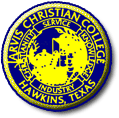 • Jarvis Christian College, the historically black educational institution in Hawkins, Texas, received a $250,000 donation from the Northway Christian Church of Dallas. The money will be used for an endowed student scholarship program. • Jarvis Christian College, the historically black educational institution in Hawkins, Texas, received a $250,000 donation from the Northway Christian Church of Dallas. The money will be used for an endowed student scholarship program.
 • Fordham University in the Bronx, New York, received a $62,500 grant from the Consolidation Edison Company of New York to fund a scholarship program for minority students interested in the study of science, technology, engineering, or mathematics. • Fordham University in the Bronx, New York, received a $62,500 grant from the Consolidation Edison Company of New York to fund a scholarship program for minority students interested in the study of science, technology, engineering, or mathematics.
 • Texas Southern University, the historically black educational institution in Houston, received a 10-year, $1 million donation from the CAMAC International Corporation, an oil service firm based in Houston. Kase Lawal, CEO of CAMAC, is an alumnus of the university. • Texas Southern University, the historically black educational institution in Houston, received a 10-year, $1 million donation from the CAMAC International Corporation, an oil service firm based in Houston. Kase Lawal, CEO of CAMAC, is an alumnus of the university.
The money will be used to establish the Lawal Center for Global Trade at the university’s business school and for an endowment fund for student scholarships.
|
 .
.